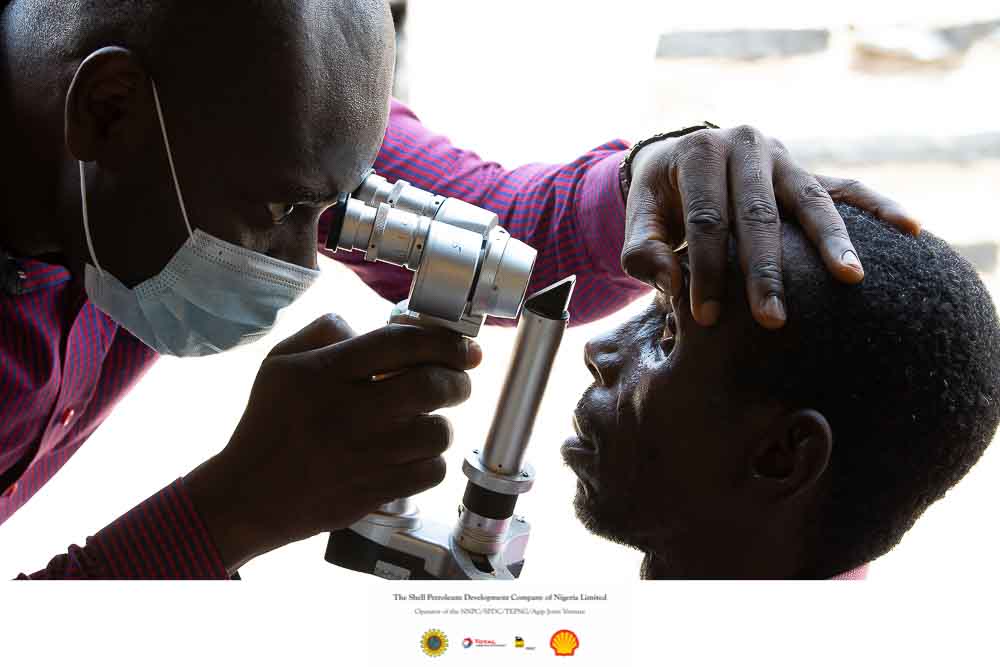By Beti Baiye and Chibuike Alagboso (Lead Writers)
Vision plays a critical role in every facet of life therefore when a person’s vision is impaired, it significantly affects their quality of life. Globally, at least 2.2 billion people have a vision impairment and of these, at least 1 billion people have a vision impairment that could have been prevented or is yet to be addressed.
In Nigeria, the leading causes of vision impairment and blindness include uncorrected refractive errors and cataracts. A significant number of these cases go untreated due to the lack of accessible eye care services and lack of awareness of where to seek services. The Lancet Global Health Commission on Global Eye Health recommends pharmacies and patent medicine vendors as an important source of health advice and simple treatments in communities. They can be engaged with to help promote eye health messages, safe prescribing, and appropriate referral. According to the Nigeria Demographic and Health Survey 2018, vision impairment is the most prominent form of disability among adults in Nigeria as eight percent of women and nine percent of men have difficulty with their vision. Not all eye conditions lead to a vision impairment or blindness, however, timely access to quality care can determine the impact of eye conditions.
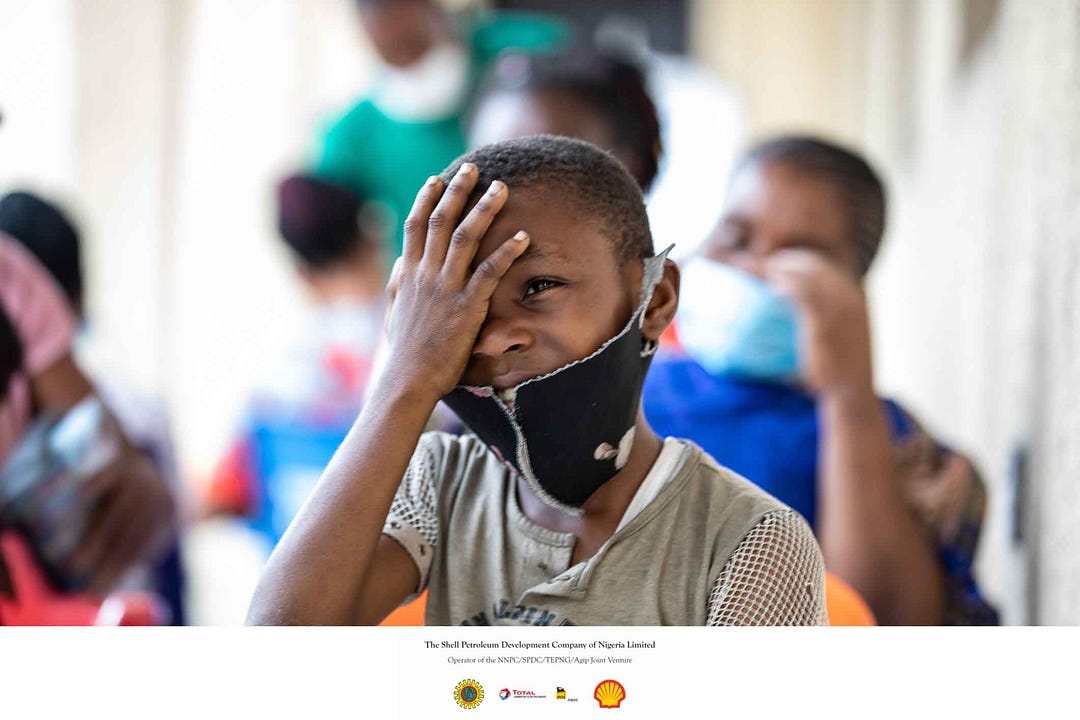
Bridging the access gap to eye care services at community level
Through its flagship ‘Health in Motion’ programme (H-I-M), Shell Petroleum Development Company of Nigeria Limited (SPDC), NNPC and its Joint Venture (JV) partners take free medical services to the doorsteps of people living in remote rural communities in the Niger Delta and beyond. Previous H-I-M community care activities identified preventable visual impairments and vision loss as a recurring health issue.
While the programme was already addressing issues with refractive errors by administering eyeglasses, it became clear that a more strategic approach was needed. This birthed the ‘Vision First Initiative’ designed to integrate eye care services into primary healthcare by providing quality eye services that eliminate preventable and treatable blindness in rural communities.
The initiative is being implemented in partnership with the governments of Bayelsa and Rivers State, host communities, and Pro-Sight International Eye Foundation, as a public-private-people-partnership. It was first piloted in 2019 in Gbarantoru community in Bayelsa State and Edagberi Betterland and Umuebule (Etche) communities in Rivers State. The pilot phase continued in 2020.
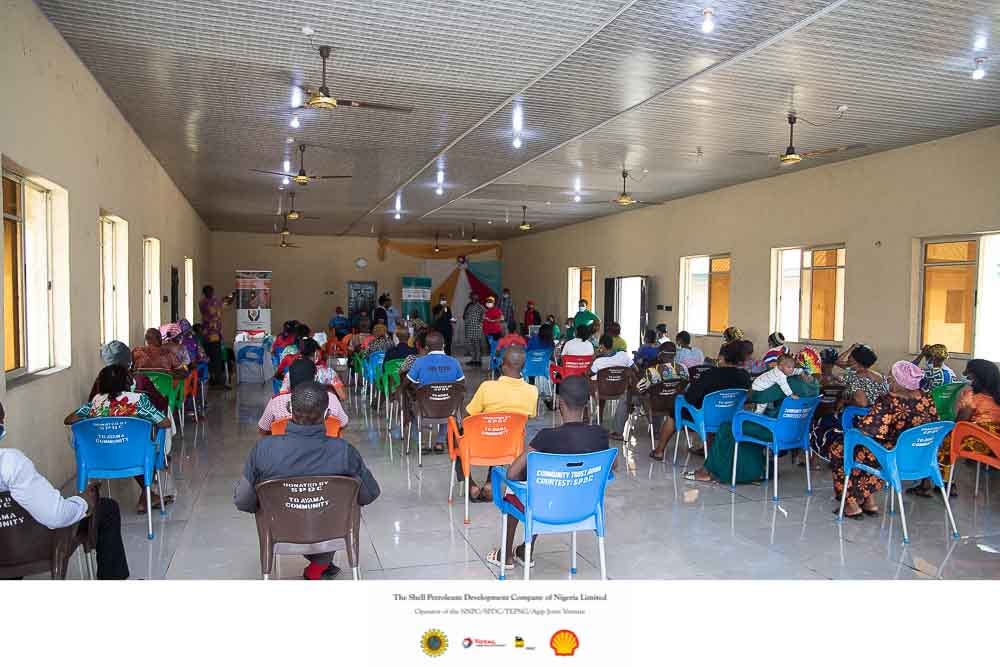
In 2021, leveraging on the successes and lessons learned from the pilot phase, the Vision First Initiative was taken to the people of Obunagha in Bayelsa State and Okoloma and Ayama communities in (Afam) Rivers State and of course, residents of neighbouring communities. The objective was to screen for visual acuity, treat any refractive errors through corrective lenses and carry out surgeries for selected cases, all free of charge.
Reaching out to communities
The health education component of H-I-M is perhaps the most important, as it is designed to educate the community members on eye health and eye care. Therefore, in each community they visit, before the screening starts, the H-I-M team takes some time to educate the community members on proper eye care. According to Dr Efeoghene Uchenna Ani, the CEO of Pro-Sight International Eye Foundation, “What we did last year and what we are still doing this year is that each community we go into, we first educate them. A lot of them did not even know that there was a solution to their problem”. They also train community members on “how to identify some of these eye problems, then we set up communication lines between us and them to reach out to us quickly. Those that need first aid, get it quickly. Those that need to be referred, are referred immediately”, Dr Ani added.
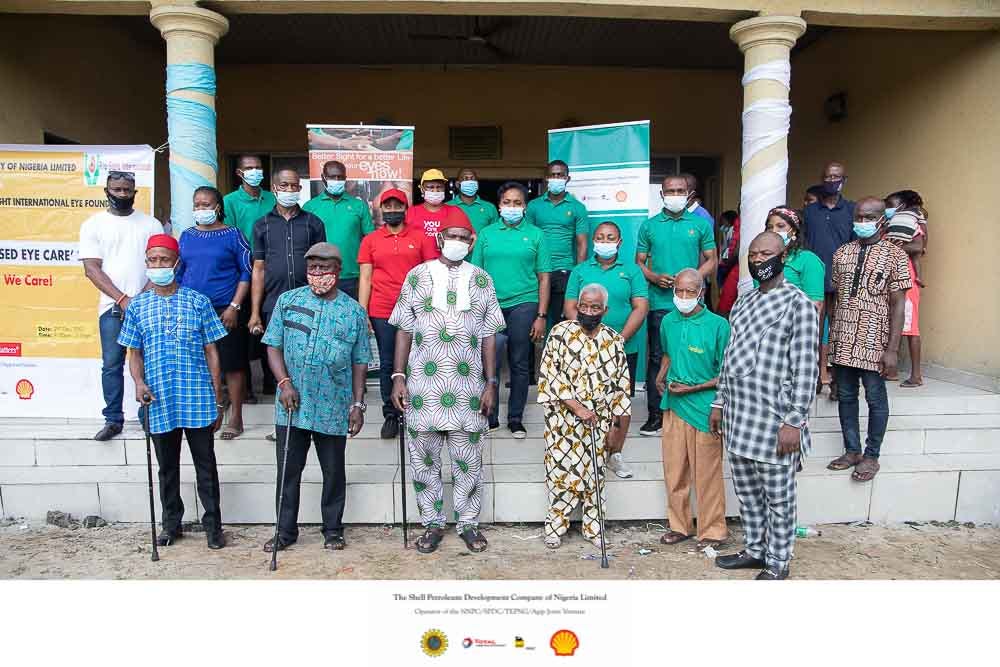
These community members are called vision finders, trained to support the delivery of quality eye care services and improve health outcomes in their respective communities. Dr Akinwumi Fajola, the Regional Community Health Manager at Shell Companies in Nigeria said training vision finders is a response to the reduced capacity gaps observed in communities. “This way we improve human resources for health and integrate eye care services into primary health care which is already written in the books but not fully implemented practically”. Thirty community volunteers have been trained as vision finders and empowered to promote good eye health-seeking behaviour among the people.
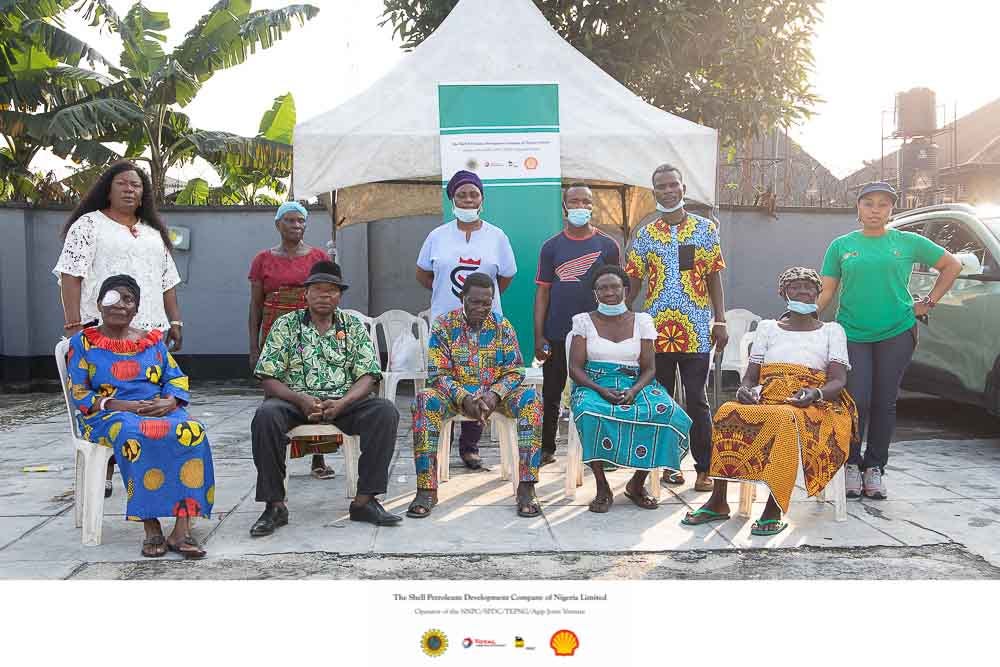
Authentic voices
In total, over 51 ophthalmic laser surgeries were carried out in all the communities in 2021. Rebecca Ogbimi, a member of the Vision First Team, said that since 2019 the initiative has reached a total of 1,833 persons.
In Obunagha community, Comrade Priye Joseph Okoko, Community Development Committee Chairman, said they were excited when the first batch of community members was taken for surgery even though they thought it was a mirage when Shell first informed them about their intentions. So far, over 30 people from Obunagha community have benefitted from the programme.
Reverend Philemon Yebiboh a retired clergyman was sad that he could no longer read his bible since he was progressively losing his sight due to cataracts, but then, he heard that the H-I-M team was visiting his community, so he went to meet with them. After examining him, the Ophthalmologist confirmed he needed surgery and he was taken to Port Harcourt. “When I came out after the operation, everything was bright. I am happy because now I can read my bible and I can see people or things that are far away.”
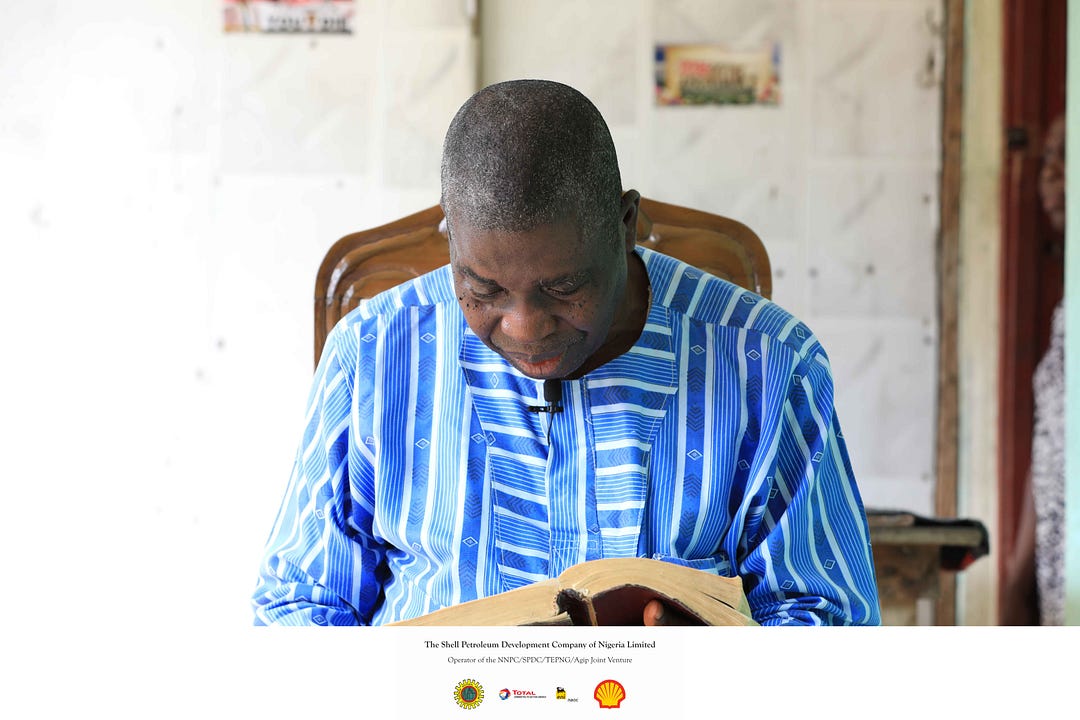
Brandy Keniyowei’s eye issues started in 1999, and when his sight failed, he was forced to stop working. He had to depend on his brothers and sisters for help and this meant that sometimes, his needs weren’t met. Now that his sight has been restored, “I am happy all the time because I can see very clearly. I want God to give Shell long life and happiness”, he said.
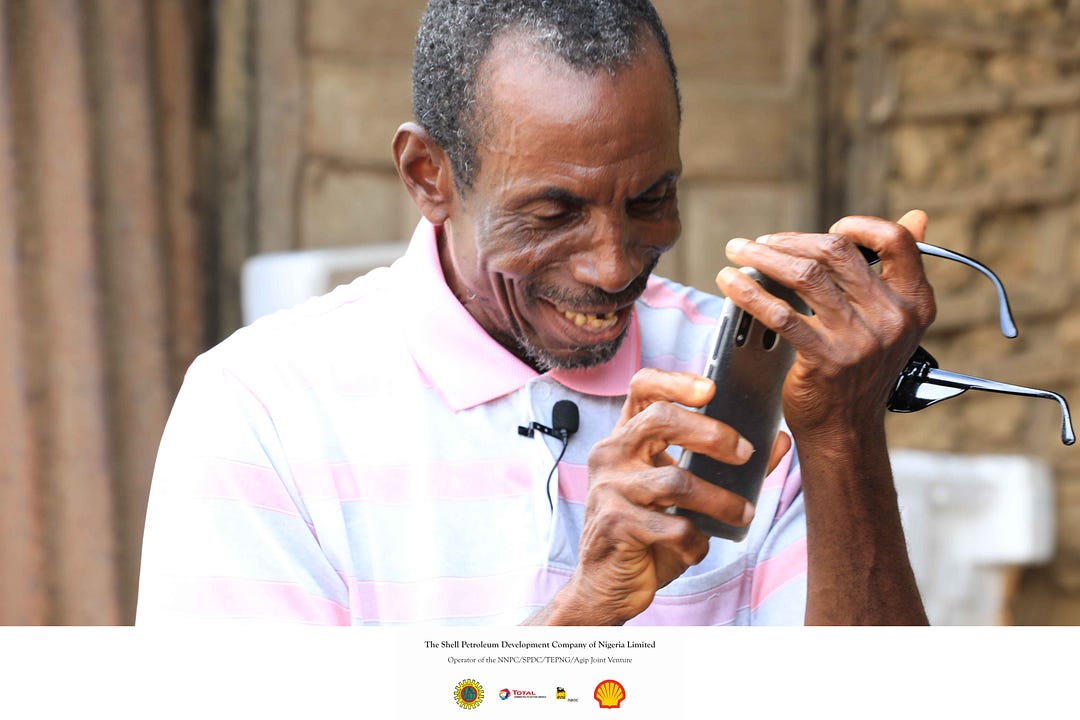
Chinagorom Ogechi had been having issues with her sight for some time, “sometimes it causes severe headaches, and my eyes feel like they want to fall out”, she said. She was diagnosed with a cataract and scheduled for surgery. As a civil servant, Ogechi said there was no way she would have been able to afford the surgery. In a voice thick with emotion she added, “I am very happy and want to say a very big thank you to Shell SPDC, Rivers State, you people have really done nobly”.
According to the Vision First team, some of the beneficiaries have, of their own volition volunteered to go on Canvas: Niger Delta Roundtable, a radio program, which airs in 5 states, to speak about their experiences, thus creating awareness. Hearing the powerful testimonies from these ‘authentic voices’ and seeing that people like them have benefitted from the project encouraged more people to take advantage of the opportunity, Fajola said.
Strategic Partnerships
While they are inspired to sustain the project as good corporate citizens, Igo Weli, SPDC’s Country Head of Corporate Relations said, “You should be clear about what you can do and what you cannot do.” With this understanding, all partners understand their role and how to contribute to the programme’s success. Dr. Ngoware Towomana, the Director of Medical Services at Bayelsa State Ministry of Health said they created an enabling environment for the H-I-M team to operate in by joining in sensitisation and advocacy to communities. “We were part of the team that came up with the manpower and security,” he said. Adding that he is familiar with most of the people who benefitted from the free surgeries and this gives him great joy.
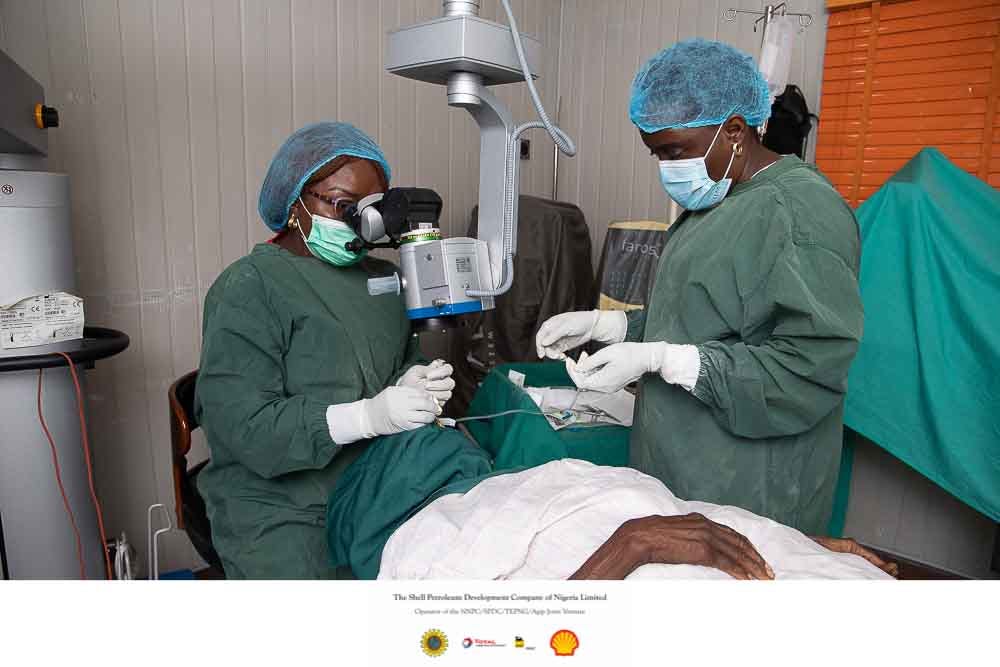
In 2020, Dr. Ndidi Utchay, Permanent Secretary Rivers State Ministry of Health said the entire state was grateful to the partners for their significant contribution to the community. “The government cannot do it all, that’s why we need partners like Shell, ProSight, and others”, she said.
There is no doubt that Vision First is indeed strengthening healthcare delivery at the primary healthcare level. But there are still thousands of Nigerian communities that can benefit from initiatives like this.
Nigeria has no specific policy for primary eye care, however, the nation’s Second National Strategic Health Development Plan (2018–2022) includes eye care as part of the non-communicable disease package and recommends scaling up eye care services at all levels, particularly at primary healthcare level. Private organisations, with their ability to move fast and efficiently, in partnership with the government, with its broad mandate, are possibly the most powerful force for positive change in society. Therefore, civil society organisations should seek to partner with the government to replicate similar initiatives and fast track the scaling up of eye care services at PHC level.


